The Making of ‘Time Simply Passes’
 The Sixth Annual Fort Myers Film Festival opened today with the screening of Time Simply Passes, a documentary about James Joseph Richardson, a man convicted in 1968 of poisoning his seven children, sentenced to death, but ultimately vindicated and released after new evidence surfaced that suggests that Richardson’s next door neighbor and baby sitter was the one who actually killed the children.
The Sixth Annual Fort Myers Film Festival opened today with the screening of Time Simply Passes, a documentary about James Joseph Richardson, a man convicted in 1968 of poisoning his seven children, sentenced to death, but ultimately vindicated and released after new evidence surfaced that suggests that Richardson’s next door neighbor and baby sitter was the one who actually killed the children.
The film is a powerful synthesis of research, 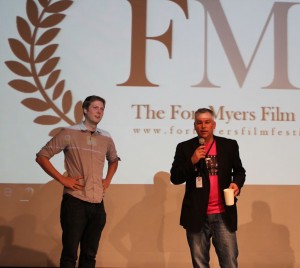 archival video. black-and-white stills, and interviews that delve not only into the circumstances surrounding the children’s poisoning and death, but the shoddy police investigation that followed, a prosecution in which potentially exculpatory evidence was suppressed, the efforts that were undertaken to get Richardson released once that evidence surfaced, and the State of Florida’s refusal to pay Richardson, now 80 and in poor health, any compensation until just last
archival video. black-and-white stills, and interviews that delve not only into the circumstances surrounding the children’s poisoning and death, but the shoddy police investigation that followed, a prosecution in which potentially exculpatory evidence was suppressed, the efforts that were undertaken to get Richardson released once that evidence surfaced, and the State of Florida’s refusal to pay Richardson, now 80 and in poor health, any compensation until just last 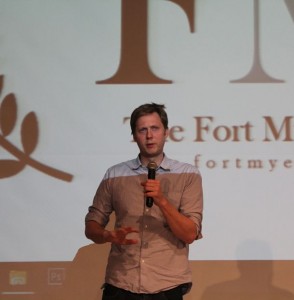 year. While the documentary addresses many aspects of this troubling and ignominious episode of Southwest Florida history, to filmmaker and director Ty Flower’s credit, the film’s structure raises as many questions about Richardson’s story as it answers. While Time Simply Passes is regrettably not in distribution at this time, there’s still lot to process, digest and debate about this nearly 50-year saga and many racial, legal, ethical and psychological lessons to be learned.
year. While the documentary addresses many aspects of this troubling and ignominious episode of Southwest Florida history, to filmmaker and director Ty Flower’s credit, the film’s structure raises as many questions about Richardson’s story as it answers. While Time Simply Passes is regrettably not in distribution at this time, there’s still lot to process, digest and debate about this nearly 50-year saga and many racial, legal, ethical and psychological lessons to be learned.
“This whole story started with the Seminole Tribe of 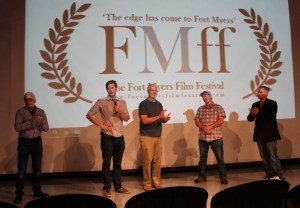 Florida’s little newspaper,” Pete Gallagher told the Fort Myers Film Festival audience in a Q&A that followed the screening. Gallagher and the filmmaker’s father, Charles Flowers, were investigative journalists and freelance reporters in the 1980s who regularly contributed stories to the Miami Herald, Tropic Magazine and New Times. “We heard about the story just as [the children’s
Florida’s little newspaper,” Pete Gallagher told the Fort Myers Film Festival audience in a Q&A that followed the screening. Gallagher and the filmmaker’s father, Charles Flowers, were investigative journalists and freelance reporters in the 1980s who regularly contributed stories to the Miami Herald, Tropic Magazine and New Times. “We heard about the story just as [the children’s 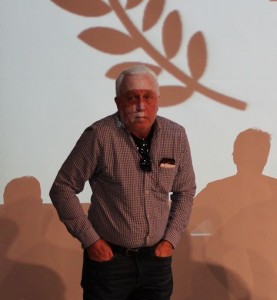 babysitter] was about to die. In fact [radio host] Paul Harvey reported on Now You Know the Rest of the Story that this lady had been found living in a nursing home, and kept saying, ‘I killed those children; I killed those children.”
babysitter] was about to die. In fact [radio host] Paul Harvey reported on Now You Know the Rest of the Story that this lady had been found living in a nursing home, and kept saying, ‘I killed those children; I killed those children.”
The prosecutor, an attorney by the name of Frank Schaub, fobbed off the confession as little more than the woman’s remorse at having been unwittingly used by Richardson to poison the kids. He claimed until the day he died that Richardson had put the parathion in the pot that the babysitter used to cook the children 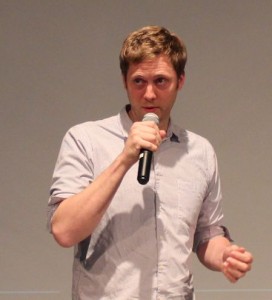 lunch that day. But there was also evidence that was never presented to either the jury or Richardson’s defense lawyer that suggests the babysitter may have had a vendetta against Richardson and that she had been involved in poisoning her first husband and had also shot her second husband to death.
lunch that day. But there was also evidence that was never presented to either the jury or Richardson’s defense lawyer that suggests the babysitter may have had a vendetta against Richardson and that she had been involved in poisoning her first husband and had also shot her second husband to death.
In any event, the death-bed confession was deemed legally insufficient to overturn Richardson’s conviction. “So Pete and my father did a big series of stories trying to get some sort of pressure put on the governor to reinvestigate the case,” Ty Flowers explained. 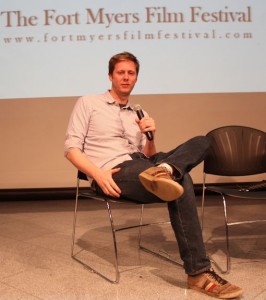 Eventually, the duo persuaded the-Governor Bob Martinez to get involved in the case. He appointed then-Miami-Dade State Attorney Janet Reno to investigate and in 1989, a judge set aside the conviction. But it wasn’t the babysitter’s conviction that did the trick, but rather a file folder of depositions, statements and other exculpatory evidence that the prosecutors had failed to disclose to the defense that led to the judge to vacate Richardson’s conviction. The assistant prosecutor’s secretary had mentioned the folder to her boyfriend, who broke into his office, stole the file, and went public with it. “It’s no
Eventually, the duo persuaded the-Governor Bob Martinez to get involved in the case. He appointed then-Miami-Dade State Attorney Janet Reno to investigate and in 1989, a judge set aside the conviction. But it wasn’t the babysitter’s conviction that did the trick, but rather a file folder of depositions, statements and other exculpatory evidence that the prosecutors had failed to disclose to the defense that led to the judge to vacate Richardson’s conviction. The assistant prosecutor’s secretary had mentioned the folder to her boyfriend, who broke into his office, stole the file, and went public with it. “It’s no 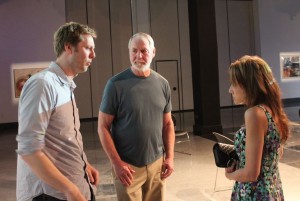 different than stopping to change someone’s tire,” said the boyfriend in the film when asked why he had put himself out there like that to help a man he had never met and did not know.
different than stopping to change someone’s tire,” said the boyfriend in the film when asked why he had put himself out there like that to help a man he had never met and did not know.
Charles Flowers’ son, Ty, had heard about the story as a child, and just assumed that after his release, Richardson had gotten some sort of 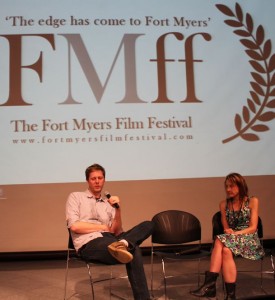 settlement so that he could “live happily ever after.” To his shock and dismay, he found out that he’d been denied any kind of help by both DeSoto County and the State of Florida. “That just didn’t make any sense at all,” Flowers said during this morning’s Q&A at the Davis Art Center. “I thought that when he got out of prison, we could all sort of celebrate a happy ending and that justice was righted. But dad said, ‘No, that’s not at all what happened.’”
settlement so that he could “live happily ever after.” To his shock and dismay, he found out that he’d been denied any kind of help by both DeSoto County and the State of Florida. “That just didn’t make any sense at all,” Flowers said during this morning’s Q&A at the Davis Art Center. “I thought that when he got out of prison, we could all sort of celebrate a happy ending and that justice was righted. But dad said, ‘No, that’s not at all what happened.’”
In 2008, Florida had passed legislation compensating the victims of wrongful incarceration, 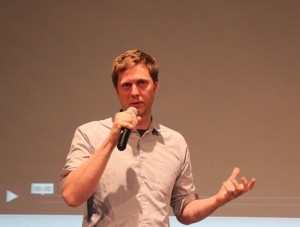 but under the enactment, a claimant had to produce DNA evidence proving that he was innocent of the crimes of which he’d been convicted. But in Richardson’s case, no such evidence existed. So now a new bill was pending in the legislature to correct that defect. As it just so happened, Flowers (a University of Florida grad who was working in television in New York) had been looking for a story he could turn into an original documentary.
but under the enactment, a claimant had to produce DNA evidence proving that he was innocent of the crimes of which he’d been convicted. But in Richardson’s case, no such evidence existed. So now a new bill was pending in the legislature to correct that defect. As it just so happened, Flowers (a University of Florida grad who was working in television in New York) had been looking for a story he could turn into an original documentary. 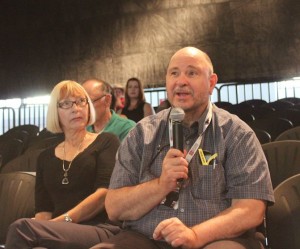 Richardson’s story and his father’s connection to it demanded to be told.
Richardson’s story and his father’s connection to it demanded to be told.
“We were going to make a short film to sort of shame them into passing the legislation rather than allowing it to just die on the House and Senate floor,” Flowers continued. But before they got very far, the bill got passed, which was just as well since they’d concluded there was no way to do justice to Richardson’s story in a short film like the  one they were planning. “So we just kind of went nuts and tried to find out everything we could about the case for the last couple of years and turned it into what you saw today.”
one they were planning. “So we just kind of went nuts and tried to find out everything we could about the case for the last couple of years and turned it into what you saw today.”
And that, the Film Festival audience learned, is how and why this compelling, most 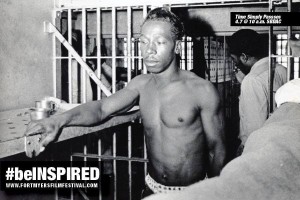 unsettling documentary got made. While the film is not in distribution, do catch it if the opportunity ever presents. In fact, there’s some talk about a second screening at another venue before the film festival ends. Check back to see if this materializes or follow the Fort Myers Film Festival on Facebook or Twitter.
unsettling documentary got made. While the film is not in distribution, do catch it if the opportunity ever presents. In fact, there’s some talk about a second screening at another venue before the film festival ends. Check back to see if this materializes or follow the Fort Myers Film Festival on Facebook or Twitter.
Related Articles.
 Film and event schedule for Thursday, April 7, 2016
Film and event schedule for Thursday, April 7, 2016- Film and event schedule for Friday, April 8, 2016 – Davis Art Center
- Film and event schedule for Friday, April 8 – Lee County Alliance for the Arts
- Film and event schedule for Friday, April 8 – Downtown Fort Myers Library
- Film and event schedule for Saturday, April 9 – Davis Art Center
- Film and event schedule for Saturday, April 9 – Lee County Alliance for the Arts
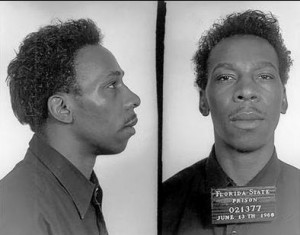 Film and event schedule for Sunday, April 10
Film and event schedule for Sunday, April 10- Regal Cinemas Belltower 20 Screenings
- Marcus Jansen documentary chosen as opening night film for Sixth Annual Fort Myers Film Festival
- Spotlight on ‘Examine & Report’ filmmaker John Scoular
- ‘Maya Angelou and Still I Rise’ screenings
- Meet ‘Maya Angelou’ filmmaker Bob Hercules
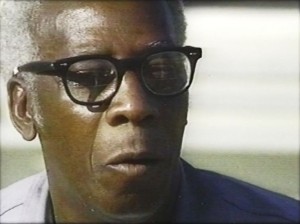 Meet ‘Maya Angelou’ filmmaker and director Rita Coburn Whack
Meet ‘Maya Angelou’ filmmaker and director Rita Coburn Whack- Embrace the Serpent
- Suited
- Time Simply Passes documentary
- Meet FMff’s sponsors, partners and beneficiaries














 Tom Hall is both an amateur artist and aspiring novelist who writes art quest thrillers. He is in the final stages of completing his debut novel titled "Art Detective," a story that fictionalizes the discovery of the fabled billion-dollar Impressionist collection of Parisian art dealer Josse Bernheim-Jeune, thought by many to have perished during World War II when the collection's hiding place, Castle de Rastignac in southern France, was destroyed by the Wehrmacht in reprisal for attacks made by members of the Resistance operating in the area. A former tax attorney, Tom holds a bachelor's degree as well as both a juris doctorate and masters of laws in taxation from the University of Florida. Tom lives in Estero, Florida with his fiancee, Connie, and their four cats.
Tom Hall is both an amateur artist and aspiring novelist who writes art quest thrillers. He is in the final stages of completing his debut novel titled "Art Detective," a story that fictionalizes the discovery of the fabled billion-dollar Impressionist collection of Parisian art dealer Josse Bernheim-Jeune, thought by many to have perished during World War II when the collection's hiding place, Castle de Rastignac in southern France, was destroyed by the Wehrmacht in reprisal for attacks made by members of the Resistance operating in the area. A former tax attorney, Tom holds a bachelor's degree as well as both a juris doctorate and masters of laws in taxation from the University of Florida. Tom lives in Estero, Florida with his fiancee, Connie, and their four cats.
So very glad to know the story is being told. I love this couple ( Richardson and his wife ). He/they deserve the truth being told.